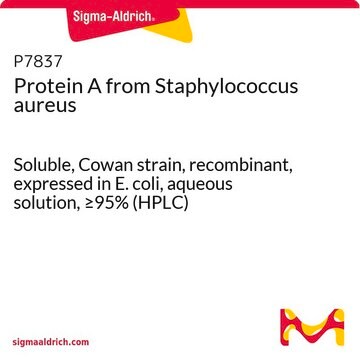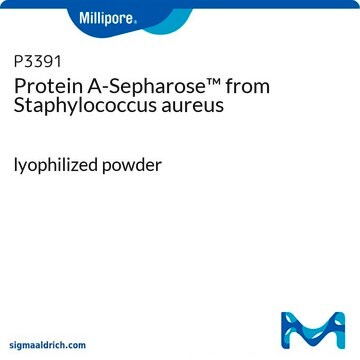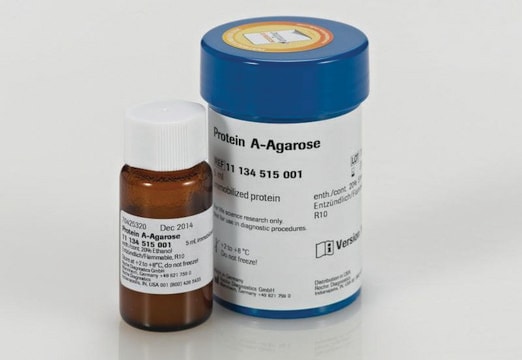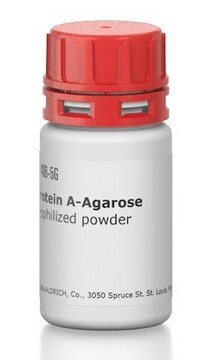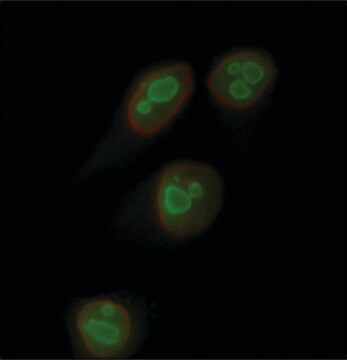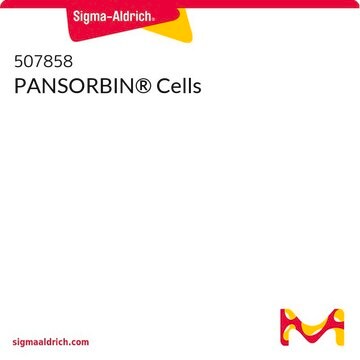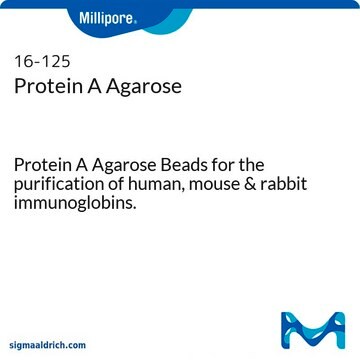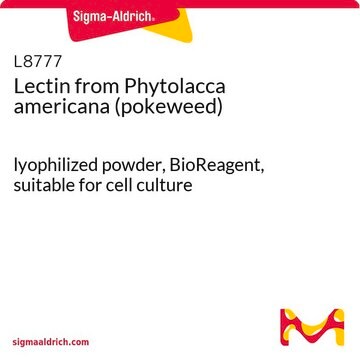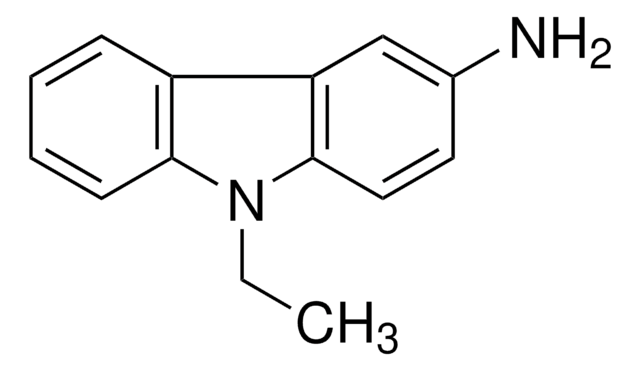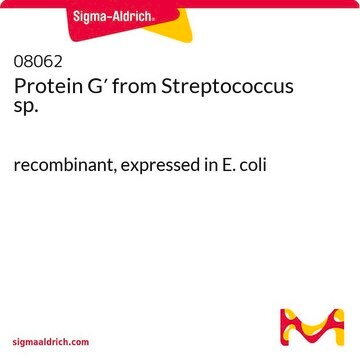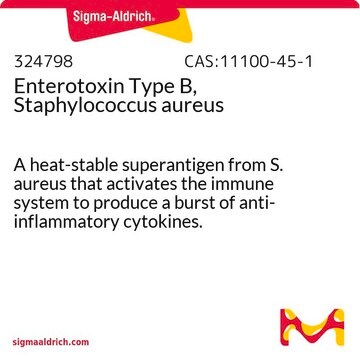P7155
Protein A from Staphylococcus aureus
Insoluble, Cowan Strain, cell suspension
Synonym(s):
Protein A
Sign Into View Organizational & Contract Pricing
All Photos(1)
About This Item
Recommended Products
conjugate
unconjugated
Quality Level
sterility
(not processed or packaged aseptically)
form
cell suspension
capacity
≥1.2 mg/mL binding capacity (human IgG)(suspension.)
UniProt accession no.
storage temp.
2-8°C
Gene Information
Staphylococcus aureus subsp. aureus NCTC 8325 ... SAOUHSC_00069(3919448)
Looking for similar products? Visit Product Comparison Guide
General description
Protein A is a 42 kD, highly stable cell surface receptor isolated from Staphylococcus aureus which binds selectively and with high affinity to the Fc portion of IgG from various species. It can also be immobilized on solid support like agarose or acrylic beads and is used for purification of monoclonal or polyclonal immunoglobulins. Protein A reacts specifically to IgG of monkey, rabbit, pig, guinea pig, dog, and cat.
Application
Protein A may be used for immunoprecipitation assays . It can be conjugated to fluorescent dyes, enzyme markers, biotin or colloidal gold and can be used in immunohistochemistry, western blotting and ELISA.
Suspension may be used directly as an immunoadsorbent. Not intended for use as a starter culture.
Protein A may be conjugated with various reporter molecules including fluorescent dyes (FITC), enzyme markers (peroxidase, β-galactosidase, alkaline phosphatase), biotin, and colloidal gold without affecting the antibody binding site on the molecule. These conjugates are used to detect immunoglobulins in various immunochemical assays including western blotting, immunohistochemistry, and ELISA applications. In addition, protein A may be immobilized on a solid support such as agarose or acrylic beads for the purification of either polyclonal or monoclonal immunoglobulins. It is also routinely used for immunoprecipitation assays.
Biochem/physiol Actions
Protein A is a highly stable cell surface receptor produced by several strains of Staphylococcus aureus. It consists of a single polypeptide chain of molecular weight 42 kDa, containing four repetitive domains rich in aspartic and glutamic acids but devoid of cysteine. It contains little or no carbohydrate and only 4 tyrosine residues and no tryptophans. Protein A is capable of binding to the Fc portion of immunoglobulins, especially IgGs, from a large number of species. One protein A molecule has been shown to bind at least 2 molecules of IgG simultaneously. The IgG binding domain of Protein A consists of three anti-parallel α-helicies, the third of which is disrupted when the protein is complexed with the Fc region of the immunoglobulins. Protein A will bind the Fc portion of human IgG subclasses, IgM, IgA and IgE; and mouse IgG1 (weakly), IgG2a, and IgG2b. Protein A also binds IgGs from other species, including monkey, rabbit, pig, guinea pig, dog, and cat.
Protein A also participates in a number of different protective biological functions including anti-tumor, toxic, and carcinogenic activities. In addition to acting as an immunomodulator, it also has antifungal and antiparasitic properties.
Protein A also participates in a number of different protective biological functions including anti-tumor, toxic, and carcinogenic activities. In addition to acting as an immunomodulator, it also has antifungal and antiparasitic properties.
Quality
Formalin treated.
Physical form
~10% (wet weight/volume) of essentially non-viable S. aureus (Cowan strain) cells in 0.04 M potassium phosphate buffer, pH 7.2, 0.15 M sodium chloride containing 0.2% sodium azide.
Preparation Note
Prepared by a method developed in our laboratory to ensure reproducible binding of IgG.
Disclaimer
Unless otherwise stated in our catalog or other company documentation accompanying the product(s), our products are intended for research use only and are not to be used for any other purpose, which includes but is not limited to, unauthorized commercial uses, in vitro diagnostic uses, ex vivo or in vivo therapeutic uses or any type of consumption or application to humans or animals.
Storage Class
12 - Non Combustible Liquids
wgk_germany
WGK 3
flash_point_f
Not applicable
flash_point_c
Not applicable
Choose from one of the most recent versions:
Already Own This Product?
Find documentation for the products that you have recently purchased in the Document Library.
Customers Also Viewed
Silvia M L Montenegro et al.
Infection and immunity, 70(11), 5903-5912 (2002-10-16)
Whole-blood-cell cultures from schistosomiasis patients were stimulated with a variety of T-cell-dependent and T-cell-independent stimuli to determine whether the defect in type 1 cytokine expression observed following helminth infection is associated with alterations in interleukin-12 (IL-12) or CD40 ligand (CD40L)
Antibodies: A Laboratory Manual
Harlow, E, Lane, D.,
Cold Spring Harbor Protocols, 616-621 (1988)
Ian J Amanna et al.
Journal of immunological methods, 317(1-2), 175-185 (2006-10-24)
Current methodology for quantitation of memory B cells (MBC) in clinical samples is limited and often does not allow for detection of multiple MBC specificities in a single assay. Here we describe two independent approaches to antigen-specific MBC quantitation. First
Coligen, J.E., et al., Eds
Current Protocols in Immunology, 8-8 (1991)
Use of protein A-bearing staphylococci for the immunoprecipitation and isolation of antigens from cells.
S W Kessler
Methods in enzymology, 73(Pt B), 442-459 (1981-01-01)
Our team of scientists has experience in all areas of research including Life Science, Material Science, Chemical Synthesis, Chromatography, Analytical and many others.
Contact Technical Service
